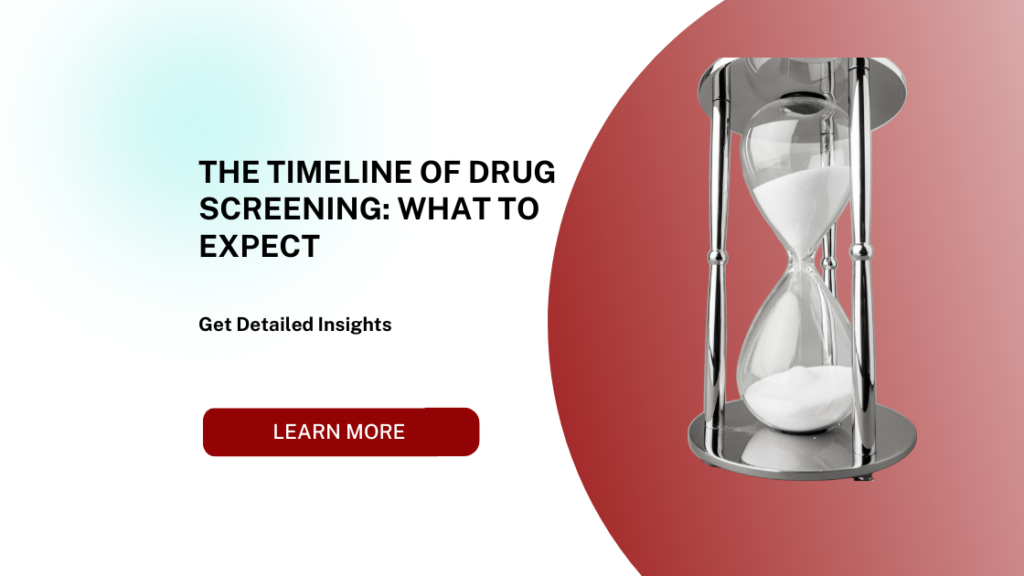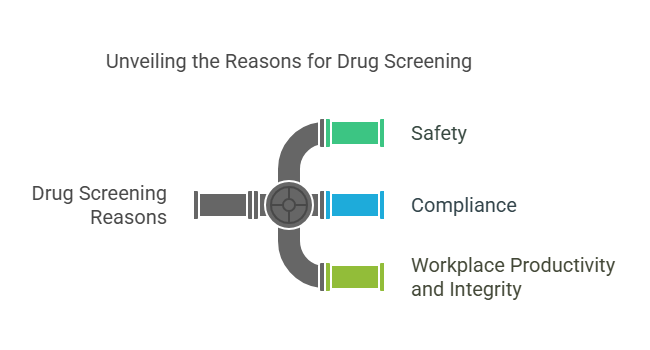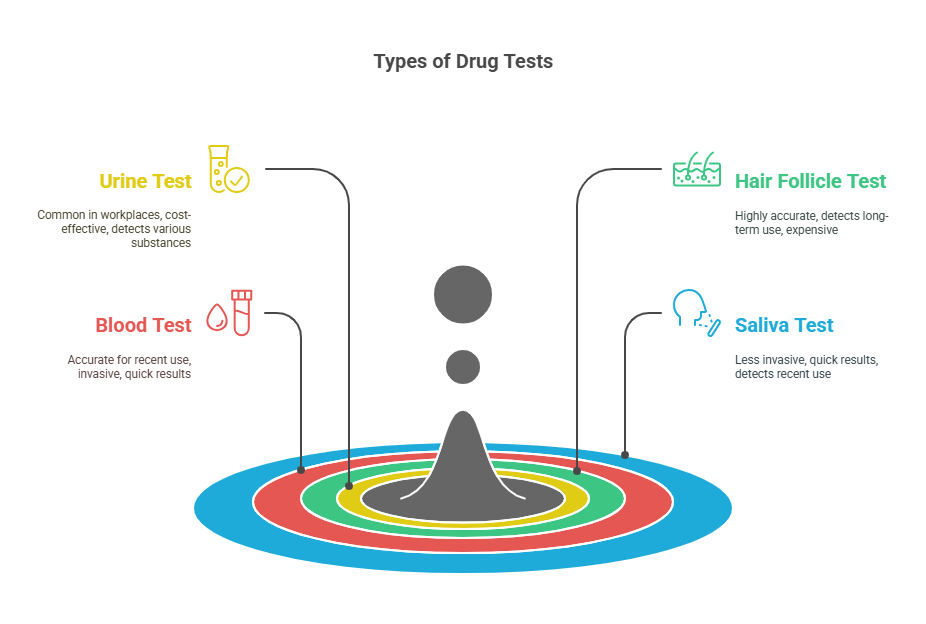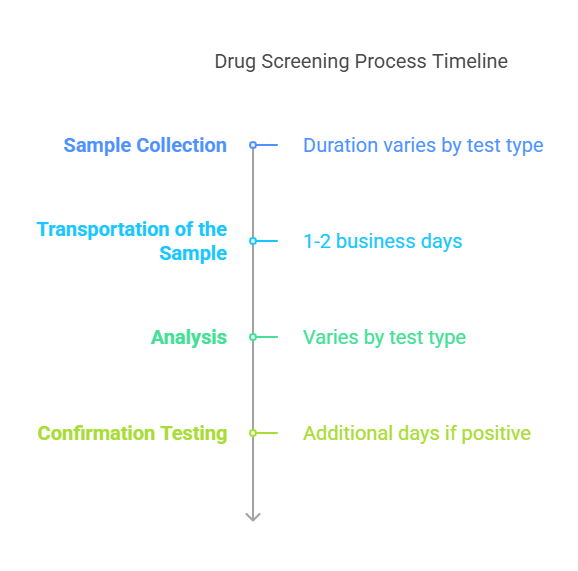The Timeline of Drug Screening: What to Expect

Introduction to Drug Screening and Factors That Affect the Duration
Drug screening is a standard procedure used by employers, organizations, and agencies to assess an individual’s use of illegal substances or prescription drugs that may impair their ability to perform their job duties. The process of drug testing is used across various industries for pre-employment checks, random drug tests, post-accident screenings, or testing for cause (e.g., suspicions of drug use).
Understanding how long the drug screening process takes is crucial for both individuals undergoing testing and the employers or organizations requiring it. The time it takes for results to be provided can vary significantly based on several factors, including the type of drug test conducted, the method of testing used, and the testing facility’s efficiency.
What is Drug Screening?
Drug screening is a process used to detect the presence of illegal or controlled substances in an individual’s system. Employers commonly conduct drug screening to ensure that their employees or potential hires are not using drugs that could impair their performance, create safety risks, or affect their job responsibilities. While drug screening is most commonly performed for employment purposes, it is also widely used in legal situations, sports testing, or even by individuals seeking to monitor their own substance use.
Why Do Employers and Organizations Conduct Drug Screening?

There are several reasons why organizations and employers may require drug screening:
- Safety: In high-risk industries such as construction, transportation, and healthcare, drug testing ensures that employees are alert and capable of performing their job without impairment.
- Compliance: Certain industries are subject to strict regulations, such as the Department of Transportation (DOT) requirements for safety-sensitive positions. Employers in these industries are required by law to conduct drug screening.
- Workplace Productivity and Integrity: Employers use drug screening to ensure that employees are not using substances that could negatively affect their job performance or the overall workplace environment.
Types of Drug Tests

Drug tests are performed using different types of biological samples. The duration of the screening process can vary based on the sample type and the testing method used. Here are the most common types of drug tests:
- Urine Test: The most common drug test used in the workplace. It is cost-effective, quick, and can detect a variety of substances.
- Hair Follicle Test: A highly accurate test that can detect drugs over a longer period (usually 90 days). However, it requires more time for processing and is typically more expensive.
- Blood Test: Less common but more accurate for detecting recent drug use. Blood tests usually provide a quicker result but are more invasive.
- Saliva Test: A less invasive option, saliva tests can provide results within minutes but are typically used to detect recent drug use.
Factors Affecting the Duration of Drug Screening

The duration of drug screening is influenced by several factors:
- Type of Drug Test: The type of test used plays a significant role in how long the process will take. For example, urine tests may provide results in as little as 24 hours, while hair follicle tests can take several days.
- Testing Method: The method of testing can also impact the time it takes to receive results. Laboratory-based testing, which is the most common method, generally takes longer compared to rapid or on-site tests that produce instant results.
- Type of Substances Tested: The number of substances being tested can also affect the time frame. A single-panel drug test might take less time than a multi-panel test, which screens for a wider variety of substances.
- Location or Testing Facility: Drug testing facilities vary in terms of speed and efficiency. Some may provide quicker results due to advanced technology and processing capabilities, while others may experience delays, especially during busy periods.
- Additional Testing or Confirmation: If a drug test result is positive, a confirmation test may be required, which could add additional time to the overall process. Gas Chromatography-Mass Spectrometry (GC-MS) is commonly used for confirmation, which may add another few days.
General Time Frame
The general time frame for drug screening can range from several hours to several days, depending on the type of test:
- Urine Test: 24-48 hours for results
- Hair Follicle Test: 3-7 days for results
- Blood Test: 24-48 hours for results
- Saliva Test: Instant or up to 24 hours for results
The Drug Screening Process and Time Frame Breakdown
The drug screening process involves several steps, from the collection of the sample to the final result. In this section, we’ll break down each step and discuss how long each part of the process typically takes.
Step-by-Step Breakdown of the Drug Screening Process

- Sample Collection
The first step in the drug screening process is collecting the sample. The time it takes to collect the sample depends on the type of test being conducted. For instance:- Urine Test: Collection takes just a few minutes. The donor is typically asked to provide a urine sample in a private restroom.
- Hair Follicle Test: The collection process may take a little longer, typically 10-15 minutes, as hair is cut from the scalp.
- Blood Test: A blood test may take 5-10 minutes for a healthcare provider to draw the sample.
- Saliva Test: Saliva collection is usually quick, often requiring only a few minutes to gather the sample.
- Transportation of the Sample
After the sample is collected, it is transported to a laboratory for analysis. The time it takes to send the sample varies depending on the facility’s location and the type of test being performed. For most samples, transportation takes about 1-2 business days. - Analysis
The analysis phase differs significantly based on the type of test:- Urine Test: For a lab-based urine test, results typically take 24-48 hours. However, rapid urine tests can provide instant results, sometimes within minutes.
- Hair Follicle Test: Hair follicle tests take the longest to process. Results usually take 3-7 days because the sample must be analyzed for traces of drugs that may have been used over a longer period.
- Blood Test: Blood tests generally take 24-48 hours to process because they are analyzed in a lab for various substances.
- Saliva Test: Saliva tests can provide instant results (in about 10 minutes) for on-site testing, but lab analysis may take up to 24 hours.
- Confirmation Testing
If the initial test returns a positive result, confirmation testing is required. The most common confirmation method is GC-MS (Gas Chromatography-Mass Spectrometry), which can add a few extra days to the process.
Time Frames for Different Types of Drug Tests
- Urine Drug Testing: Lab-based tests typically take 24-48 hours to return results, but instant tests can provide results within minutes.
- Hair Follicle Drug Testing: Hair tests are more comprehensive but take 3-7 days to process and return results.
- Blood Drug Testing: Blood tests can take 24-48 hours for results.
- Saliva Drug Testing: Saliva tests provide instant results or results within 24 hours.
Exactbackgroundchecks Services
Services like exactbackgroundchecks can streamline the process for businesses and individuals seeking drug screening services. Their platform provides fast and reliable drug testing services, helping companies get accurate results quickly. Using such services can save time and ensure that businesses remain compliant with industry regulations.
Legal Aspects of Drug Screening
Drug screening is regulated by both federal and state laws. Employers must adhere to these regulations to ensure that their drug testing policies are legally compliant:
- Americans with Disabilities Act (ADA): Employers must ensure that drug testing does not discriminate against individuals with disabilities and that it’s done fairly across all applicants.
- Drug-Free Workplace Act: Employers who want to receive federal grants or contracts must maintain a drug-free workplace and follow certain drug testing procedures.
- Industry Regulations: Specific industries, such as transportation or healthcare, have additional requirements regarding drug testing.
FAQs About Drug Screening
What is drug screening and why do employers conduct it?
Drug screening detects illegal or controlled substances in an individual's system. Employers conduct it for safety, compliance, and to ensure workplace productivity and integrity.
What are the common types of drug tests and how do their time frames differ?
Common tests include urine (24-48 hours), hair follicle (3-7 days), blood (24-48 hours), and saliva (instant to 24 hours), with hair follicle tests typically taking the longest.
What factors affect the duration of drug screening?
Factors include the type of drug test, testing method (lab vs. rapid), substances tested, location/efficiency of the facility, and the need for confirmation testing.
How does the drug screening process break down in terms of time?
The process includes sample collection (minutes), transportation (1-2 days), analysis (hours to days depending on test), and possible confirmation testing (additional days).
What are the legal aspects to consider regarding drug screening?
Legal aspects include compliance with the Americans with Disabilities Act (ADA), the Drug-Free Workplace Act, and industry-specific regulations, ensuring fair and non-discriminatory testing practices.
Conclusion
Understanding how long drug screening takes and the various factors involved is essential for both individuals and organizations. Whether you’re undergoing a test or managing the process for your company, knowing the typical time frames, the testing methods, and the potential for confirmation testing helps ensure a smooth experience.



